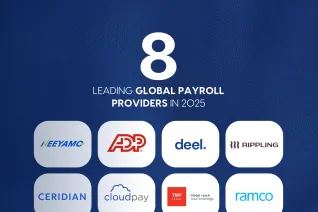Navigating Payroll Tax Compliance Across Borders: A Global Business Guide

Tax is like a coin with two sides. On the one hand, it is a mandatory social contribution and on the other, it is a cost like any other
The Three Ts of Tax – Technology, Transparency, and Trust by PwC.
While tapping into global talent beyond borders brings new opportunities to expand globally, it also introduces one of the most intricate challenges—navigating payroll tax compliance. With operations spanning multiple countries, businesses must manage a complex array of payroll and tax obligations, each tied to a distinct legal framework, deadlines, and compliance requirements.
Ignoring these complexities or approaching them with insufficient knowledge can lead to serious repercussions, ranging from financial penalties to reputational damage and operational disruptions. In this blog, we'll examine the common pitfalls businesses face when handling global payroll tax compliance and provide actionable solutions for smooth, compliant operations across borders.
Why is the Global Payroll Tax Landscape Complex and Ever-Changing?
Payroll taxes operate in entirely distinct ways across different countries. Some nations may impose high-income tax rates, while others emphasize social security contributions. This is just one aspect of the broader, multifaceted landscape of global payroll taxes. Businesses must also stay informed about varying deadlines, tax treaties, employee benefit contributions, and social security obligations.
Here are some of the most significant pitfalls that global businesses face when managing payroll tax compliance across borders:
1. Diverse and Complex Tax Systems
Each country's tax regime is unique, often varying within its borders. For example, while US employees in New York face state income taxes, those in Texas do not. This complexity becomes exponentially greater when operating across multiple countries. Even within the EU, each member state maintains its payroll tax rules despite shared labor and business regulations. Brazil further complicates matters with municipal taxes that vary by location.
Adherence to local payroll tax regulations is essential, as non-compliance can result in significant penalties, including fines, interest charges, and potential legal action. Additionally, non-compliance can damage a company's reputation and make securing future business opportunities difficult.
2. Constant Regulatory Changes
Global tax regulations are far from static. Governments regularly update tax laws, adjust tax rates, and introduce new social contribution requirements. The OECD (Organization for Economic Co-operation and Development) reports frequent tax policy changes within its member nations.
For multinational businesses, missing these regulatory updates can have significant financial implications, including tax miscalculations, failure to meet new requirements or delayed filings—all of which can result in fines. Real-time tax policy change monitoring is essential to maintaining compliance.
ALSO READ: Navigating the Global Workforce: Your Compliance Guide For Remote Hiring
3. Varied Payroll Reporting and Filing Requirements
Not only do tax rates differ across borders, but payroll reporting schedules also vary significantly. The US requires quarterly reporting for payroll taxes, while many European and Asian countries mandate monthly or annual reports. Some jurisdictions mandate electronic filing via government portals, while others still accept manual submissions through traditional paper formats.
Businesses must manage various reporting cycles and submission formats to ensure compliance. Missing a filing deadline by just a day can trigger costly penalties or spark a tax audit. Streamlining these reporting processes requires careful planning and monitoring of all jurisdictions where the business operates.
4. Handling Currency Conversion and Exchange Rate Fluctuations
Global payrolls often require paying employees in their local currencies, introducing additional challenges in currency conversion for tax purposes. Payroll tax obligations may be calculated in one currency while employee wages are paid in another, and fluctuating exchange rates can disrupt accurate tax calculations.
For instance, a company might pay employees in EUR while calculating payroll taxes in USD. Any fluctuation in the EUR/USD exchange rate could alter payroll tax obligations, resulting in overpayment or underpayment. Staying compliant requires a thorough understanding of currency fluctuations and their impact on payroll tax calculations.
5. Ensuring Compliance with Social Contributions and Employee Benefits
Beyond basic income tax withholdings, many countries require contributions to social programs, including pensions, healthcare, and unemployment insurance. Calculating and submitting these contributions accurately is crucial, as non-compliance can lead to legal liabilities and penalties.
For example, France's payroll tax structure heavily emphasizes social contributions, covering various benefits from healthcare and unemployment insurance. Compliance requires employers to ensure that employee and employer contributions are calculated correctly, often considering factors such as salary level, employment type, and employee age.
What are the Best Practices for Navigating Payroll Tax Compliance Across Borders?
Given the above-mentioned complexities, businesses need a strategic approach to ensure compliance. Below are five best practices to help companies manage payroll tax obligations across multiple countries:
1. Invest in Global Payroll Software
According to EY's recent survey, tax personnel spend 72% of their time on routine compliance work (including data collection and cleansing, tax return compliance, and related reconciliations) and 28% on higher-value work such as data analysis, tax planning, managing tax controversy, general strategy, communications, and risk management.
Automation plays a crucial role in streamlining global payroll compliance regulations. Modern payroll platforms empower businesses to handle tax calculations, stay abreast of regulatory updates, and meet filing obligations. A comprehensive payroll software solution centralizes payroll data from multiple countries, ensuring real-time accuracy in tax compliance. These technology-driven platforms offer uniform reporting and multi-currency support, allowing businesses to manage diverse tax systems effortlessly while minimizing the likelihood of errors.
Read now: Simplify Tax Compliance in Global Payroll with These Tips
2. Leverage Local Expertise
Understanding local regulations is critical to staying compliant. Partnering with local payroll providers ensures businesses have the support they need to navigate complex tax frameworks, from regional tax nuances to social security contribution calculations.
Local experts can also help businesses stay updated on regional tax policy changes and interpret local tax treaty provisions to minimize tax liabilities. This reduces the risk of compliance failures due to a lack of jurisdiction-specific knowledge.
3. Proactive Payroll Audits: A Safeguard Against Compliance Issues
Regular payroll audits are essential for businesses to identify and rectify errors in tax calculations, filing, and reporting errors. By conducting routine audits, businesses can detect discrepancies early on, preventing them from escalating into costly compliance issues.
Frequent audits also ensure that payroll calculations accurately reflect the latest tax updates and that tax reporting across all regions is consistent with local laws. This proactive approach helps businesses maintain compliance, avoid penalties, and protect their financial health.
4. Mitigating Double Taxation for Cross-Border Employees
Cross-border employees often face the challenge of double taxation. Bilateral tax treaties offer a valuable solution by establishing rules to allocate taxing rights between countries. Businesses must regularly assess the applicability of tax treaties to their cross-border employees, considering factors such as employment locations, income types, and treaty provisions.
Maintaining detailed records of employee assignments, income sources, and treaty benefits is crucial for demonstrating compliance and avoiding penalties. Staying informed about treaty modifications, expirations, and interpretations is also essential. This can be achieved through tax advisors, government publications, and international organizations.
Know more: Global Compliance Report - August 2024
5. Develop a Robust Compliance Strategy
Businesses should establish a global compliance framework that ensures all relevant filing deadlines are tracked, payroll systems are updated with the latest tax laws, and regular communication with local tax authorities is maintained.
Collaborating with a trusted global payroll partner or developing a compliance team helps businesses stay ahead of evolving tax regulations and minimize risks.
The High Stakes of Non-Compliance
Not adhering to tax regulations can lead to a financial nightmare. From hefty fines and penalties to legal repercussions, the consequences of non-compliance can be severe. Businesses that fail to stay updated with tax laws and regulations risk damaging their reputation, losing customer trust, and even facing closure.
Additionally, non-compliance can have far-reaching implications, including difficulties securing loans, obtaining government contracts, and attracting investors. It's a gamble that simply isn't worth taking. By prioritizing tax compliance, businesses can protect their financial stability, maintain a positive reputation, and focus on growth.
Why Neeyamo is Your Ideal Global Payroll Partner
Navigating payroll tax compliance across borders requires precision, expertise, and the right technology. Neeyamo offers a comprehensive, centralized payroll platform to simplify tax compliance across more than 160 countries. With real-time tax updates, multi-currency support, and in-depth local expertise, Neeyamo ensures that businesses stay compliant while focusing on global growth.
By partnering with Neeyamo, businesses can efficiently manage payroll tax obligations and ensure full compliance, safeguarding their operations from the pitfalls of international payroll complexities.
Latest Resources
Stay informed with latest updates
If you're curious and have a thirst for knowledge pertaining to the HR, payroll, and EOR universe, don't miss out on subscribing to our resources.















